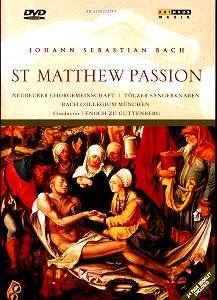The conductor, lighting director and general animateur
of this curious affair is likely to be an unknown name to those unfamiliar
with the pearls of the FARAO back catalogue, in which Enoch zu Guttenberg
takes something of a starring role. FARAO is Munich-based, as Guttenberg
himself seems to be, having established the choir you hear on this recording
in 1967 and, 30 years later, the chamber orchestra Klangverwaltung with
which he is responsible for dynamic and thoughtful discs of Beethoven’s
Third and Eighth Symphonies, the Christmas Oratorio and others.
If you played the first chorus of this St Matthew Passion
on sound only back to back with ‘Jauchzet, frohlocket’, however, I wager
you would never attribute them to the same conductor. Can it really
be Passiontide that induced Guttenberg to abandon small forces, lithe
tempos and pointed articulation? What we hear and see instead closely
approximates to Karl Richter’s Passion recordings from 30 years ago
and more. The aggressive stolidity that occasionally marred Richter’s
disciplined performances was counterbalanced by almost unfailingly accurate
execution and – yes – passion, transferred from Richter to his performers.
Such ample compensations are missing here, as is evident from the first
bars of ‘Kommt, ihr Tochter’. It’s not the bass-heavy texture that threatens
to rob the music of vitality and danger but the sheer unvarying flatness
of it all. You can actually see the strings never lighten their bowing,
not even in the B section (‘Seht! Wohin? Wohin? Wohin? Der Brautigam!’).
The orchestra’s brief dynamic swell after that phrase is the only moment
when the dynamic moves outside mezzoforte-forte for the whole movement.
A well-judged tempo, halfway between the monumentality of Richter and
Mengelberg and the minatory muscle of Gardiner and Scherchen, strictly
maintained throughout, ensures that tension is effectively built up
until released in a mighty rallentando in the last two bars. Old-fashioned,
and I love it.
I wouldn’t be surprised if some of the chorus members
had sung for a Richter Passion – its age range is broad – as its 80
or so members are nothing if not well-drilled and lusty. I’m sure they
are able to sing with a larger dynamic range and phrasal flexibility
but they are never encouraged to do so. The intensity that the Munich
Bach Choir brings to many of the chorales is absent here, possibly because
of the extra choir placed at the back of the church which joins in at
those points. The device probably worked wonderfully for the audience
at the time, but the recording doesn’t convey a spatial effect at all
and merely muddies the blend of instruments and voices.
The whole performance in fact see-saws between insensitivity
and deep affection, sometimes in the space of a few bars. How crudely
the strings play the opening ritornello of ‘Blute nur’, completely ignoring
the dying and sighing phrases, and how captivatingly Margaret Marshall
then sings them, with full, pleading tone and generous portamento. Over
in the side chapel where the Evangelist is placed with his continuo
cohorts it is Anja Lechner (cellist of the marvellous Rosamunde Quartett)
who is alive to every turn of phrase while Claes Hakon Ahnsjö often
resorts to plain declamation. His name can be found on many oratorio
performances from the 60s and 70s (always as Claes H. Ahnsjo) but it’s
nice to see he was still going strong in 1990. There’s more than a touch
of Ernst Haefliger or Peter Schreier about his slightly bleaty sound
and fearless high notes, but he doesn’t equal them for range of expression.
With the ripieno boys chorus placed in a gallery high
above the altar and Christus below them at the back of the orchestra,
you’d think that this spatial awareness would lend extra drama, but
it is vitiated by the clunky direction for video. Though there are plenty
of camera angles they are used primitively: every chorale begins with
a shot of the same pillar, from which it pans jerkily to show the chorale
choir at a distance such that we never see their faces. I doubt that
the score or conductor were consulted: during the ritornello to ‘So
ist mein Jesus nun gefangen’, the soprano-alto duet which lies at the
heart of Part I, we see nothing but the subsidiary violin line while
the crucial flute parts are ignored, thus contradicting the musical
direction. Prey sings steadily and nobly, but he looks so hangdog, with
an unopened copy of the score hanging limply in one hand, that the strong
musical impression is undermined. Most of the soloists sing without
music, yet they all hold copies of the (out of date) Peters score. Aldo
Baldin’s tenor solos sound fine, if hardly graceful, but his strained,
effortful appearance is painful to watch. Van Nes and Scharinger are
always pleasing to ear and eye, and indeed with Marshall they make up
the principal virtues of this performance.
Star ratings were not designed for curate’s eggs like
this: for despite the shortcomings suggested above, the integrity of
Guttenberg’s musical conception impresses me the more I hear it, and
much of the solo singing is among the best on record. Curious though
it sounds, this would be a much more tempting release on CD.
Peter Quantrill


